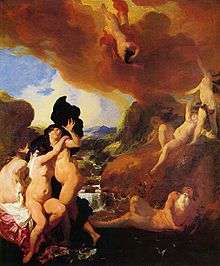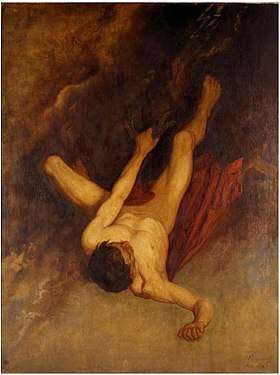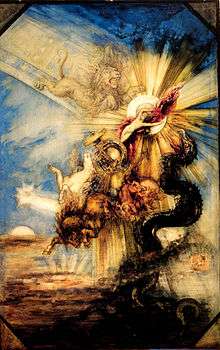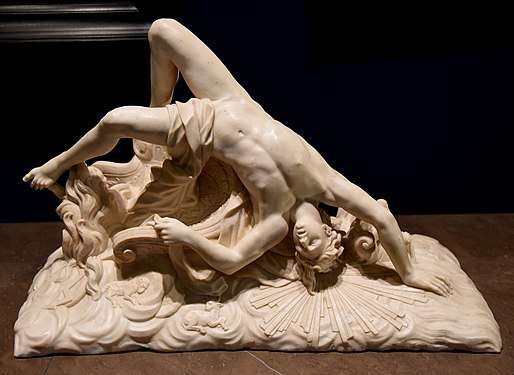Phaethon
Phaethon (/ˈfeɪ.əθən/; Ancient Greek: Φαέθων, Phaéthōn, pronounced [pʰa.é.tʰɔːn]) was the son of the Oceanid Clymene and the solar deity Helios in Greek mythology. His name was also used by the Ancient Greeks as an alternative name for the planet Jupiter,[1] the motions and cycles of which were personified in poetry and myth.

Mythology
Phaethon was said to be the son of the Oceanid Clymene and the solar deity Helios.[2][3] Alternatively, less common genealogies make him a son of Clymenus by Oceanid Merope,[4] of Helios and Rhodos (thus a full brother of the Heliadae)[5] or of Helios and Prote.[6]
Phaethon, challenged by Epaphus and his playmates, sought assurance from his mother that his father was the sun god Helios. She gave him the requested assurance and told him to turn to his father for confirmation. He asked his father for some proof that would demonstrate his relationship with the sun. When the god promised to grant him whatever he wanted, he insisted on being allowed to drive the sun chariot for a day.[7][8] According to some accounts Helios tried to dissuade Phaethon, telling him that even Zeus was not strong enough to steer these horses, but reluctantly kept his promise.[9] Placed in charge of the chariot, Phaethon was unable to control the horses. In some versions, the Earth first froze when the horses climbed too high, but when the chariot then scorched the Earth by swinging too near, Zeus decided to prevent disaster by striking it down with a thunderbolt.[10] Phaethon fell to earth and was killed in the process.[11]
Phaethon was the good friend or lover of Cycnus of Liguria, who profoundly mourned his death and was turned into a swan.[12] Phaethon's seven sisters, the Heliades, also mourned his loss, keeping vigil where Phaethon fell to Earth until the gods turned the sisters into poplar trees, and their tears into amber.[13]
Plato's Timaeus
In Plato's Timaeus, Critias tells the story of Atlantis as recounted to Solon by an Egyptian priest, who prefaced the story by saying:
"There have been, and will be again, many destructions of mankind arising out of many causes; the greatest have been brought about by the agencies of fire and water, and other lesser ones by innumerable other causes. There is a story that even you [Greeks] have preserved, that once upon a time, Phaethon, the son of Helios, having yoked the steeds in his father's chariot, because he was not able to drive them in the path of his father, burnt up all that was upon the earth, and was himself destroyed by a thunderbolt. Now, this has the form of a myth, but really signifies a declination of the bodies moving in the heavens around the earth, and a great conflagration of things upon the earth, which recurs after long intervals."[14]
 The Fall of Phaëthon on a Roman sarcophagus (Hermitage Museum)
The Fall of Phaëthon on a Roman sarcophagus (Hermitage Museum)
Ovid's version
In the version of the myth told by Ovid in the Metamorphoses, Phaethon ascends into heaven, the home of his suspected father. His mother Clymene had boasted that his father was the Sun-God or Phoebus. Phaethon went to his father who swore by the river Styx to give Phaethon anything he would ask for in order to prove his divine sonship. Phaethon wanted to drive the chariot of the sun for a day. Phoebus tried to talk him out of it by telling him that not even Jupiter (the king of the gods) would dare to drive it, as the chariot was fiery hot and the horses breathed out flames. He said:
"The first part of the track is steep, and one that my fresh horses at dawn can hardly climb. In mid-heaven it is highest, where to look down on earth and sea often alarms even me and makes my heart tremble with awesome fear. The last part of the track is downwards and needs sure control. Then even Tethys herself, who receives me in her submissive waves, is accustomed to fear that I might dive headlong. Moreover, the rushing sky is constantly turning, and drags along the remote stars, and whirls them in rapid orbits. I move the opposite way, and its momentum does not overcome me as it does all other things, and I ride contrary to its swift rotation. Suppose you are given the chariot. What will you do? Will you be able to counter the turning poles so that the swiftness of the skies does not carry you away? Perhaps you conceive in imagination that there are groves there and cities of the gods and temples with rich gifts. The way runs through the ambush, and apparitions of wild beasts! Even if you keep your course, and do not steer awry, you must still avoid the horns of Taurus the Bull, Sagittarius the Haemonian Archer, raging Leo and Lion's jaw, Scorpio's cruel pincers sweeping out to encircle you from one side, and Cancer's crab-claws reaching out from the other. You will not easily rule those proud horses, breathing out through mouth and nostrils the fires burning in their chests. They scarcely tolerate my control when their fierce spirits are hot, and their necks resist the reins. Beware, my boy, that I am not the source of a gift fatal to you, while something can still be done to set right your request!"[15]

Phaethon was adamant. When the day came, the fierce horses that drew the chariot felt that it was empty because of the lack of the sun-god's weight and went out of control. Terrified, Phaethon dropped the reins. The horses veered from their course, scorching the earth, burning the vegetation, bringing the blood of the Ethiopians to the surface of their skin and so turning it black, changing much of Africa into a desert, drying up rivers and lakes and shrinking the sea. Earth cried out to Jupiter who was forced to intervene by striking Phaethon with a lightning bolt. Like a falling star, Phaethon plunged blazing into the river Eridanos.
The epitaph on his tomb was:
- Here Phaethon lies who in the sun-god's chariot fared. And though greatly he failed, more greatly he dared.[16]
Phoebus, stricken with grief at his son's death, at first refused to resume his work of driving his chariot, but at the appeal of the other gods, including Jupiter, returned to his task.
Clement of Alexandria
According to Clement of Alexandria in his Stromata, "...in the time of Crotopus occurred the burning of Phaethon, and the deluges of Deucalion.[17]
Suetonius
In The Twelve Caesars, Suetonius attributes to the emperor Tiberius the following repeated remark about the future emperor Gaius Caligula: "That to allow Gaius to live would prove the ruin of himself and of all men, and that he was raising a viper for the Roman people and a Phaethon for the world".[18]
Other ancient writers

Fragments of Euripides' tragedy on this subject suggest that, in his account, Phaethon survives. In reconstructing the lost play and discussing the fragments, James Diggle has discussed the treatment of the Phaethon myth (Diggle 2004).
In the True History by the satirical Greek writer Lucian, Phaëthon is king of the sun and is at war with the moon.
Post-classical works
- Dante refers to the episode in the Inferno, in "Purgatorio" Canto IV and Paradiso Canto XVII of his Divine Comedy.
- William Shakespeare uses the story of Phaethon in four places, most famously as an allegory in his play Richard II. He also makes Juliet wish "Phaëthon would whip [Apollo's horses] to the west" as she waits for Romeo in Romeo and Juliet 3.2.3.[19] It also appears briefly in The Two Gentlemen of Verona 3.1.154, and twice in Henry VI, Part 3 (1.4.33 and 2.6.12)[20]
- John Marston includes reference to Phaeton in The Malcontent whereby Mendoza's monologue describes the '...sparkling glances (of women), ardent as those flames that singed the world by heedless Phaeton!' - Act 1, Scene 5
- Jean-Baptiste Lully wrote a musical tragedy, Phaëton, in which he referred indirectly to the fate of Nicolas Fouquet, whose ambitions to imitate Louis XIV—The Sun King—brought about his downfall. This opera is also used in the second version of Paul Hindemith’s opera Cardillac (1952).
- Camille Saint-Saëns wrote a symphonic poem entitled Phaéton in 1873.
- Niccolò Jommelli wrote an opera Fetonte to an Italian-language libretto by Mattia Verazi using various sources, principally Ovid, for the myth of Phaeton. It was first performed at the Ducal Theatre, Ludwigsburg in February, 1768, where Duke Karl-Eugen of Württemberg maintained an opera troupe.
- Wilhelm Waiblinger’s epistolary novel Phaëthon amalgamates the Phaethon myth with Goethe’s Werther as well as Hölderlin’s Hyperion.
- Johann Wolfgang Goethe published a poetic reconstruction of Euripides’ fragmented tragedy in Kunst und Altertum (1823), which served as a basis for various full-scale dramatic adaptations such as Marie Wernicke’s Phaethons Sturz (1893), Karl Wilhelm Geißler’s Phaëthon (1889) and Arnold Beer’s Phaeton (1875).
- Gerhart Hauptmann’s long poem Helios und Phaethon (1936) omits the cosmic disaster in order to focus on the relationship between godly father and mortal son.
- In Otakar Theer's symbolist tragedy Faëthón (1916), the hero epitomizes man's revolt against the world order ("the gods") and against human destiny. The tragedy was adapted in 1962 into a celebrated eponymous radio play by Miloslav Jareš (director) and Jaromír Ptáček (dramaturge).[21]
- Paul Goodman’s early Phaëthon, Myth (1934) juxtaposes the Phaethon myth with a grotesque version of a Christological narrative.
- Benjamin Britten’s Six Metamorphoses after Ovid for oboe, first performed at the Aldeburgh Festival on 14 June 1951, include the short piece Phaeton, which as a solo piece seems to focus on the individual lost in space rather than the furious effects emphasised by earlier instrumental renditions of the myth.
- In Ayn Rand's 1957 novel Atlas Shrugged, an in-universe opera is composed by the character of Richard Halley where Phaeton succeeds in his attempt to control the chariot of the sun, as an allegory for the power of mankind and individualism.
- Donald Cotton wrote a comedy radio play 'The Tragedy of Phaethon' broadcast on BBC Network 3 on 10 February 1965.[22]
- Angus Wilson’s novel Setting the World on Fire (1980) opens with the description of a Phaethon painting which proves pivotal to the protagonist’s emerging self-conception, leading up to his production of Lully’s Phaëton.
- John C. Wright's The Golden Oecumene Trilogy (2002) features a protagonist named Phaethon, whose father's name is Helion. Mythical references abound.[23]
- In 2002, Volkswagen introduced the VW Phaeton.
- In 2012, former Disco Inferno frontman Ian Crause adapted the story of Phaethon as The Song of Phaethon for his first musical release in over a decade. Crause used the story as an analogy for Britain's entry into the Second Gulf War.[24]
- in 2016 Taffety Punk Theatre premiered Michael Milligan's play "Phaeton" in Washington, DC.[25]
Shared name
The name "Phaethon", which means "Shining One",[26] was given also to Phaethon of Syria, to one of the horses of Eos (the Dawn), the Sun, the constellation Auriga, and the planet Jupiter, while as an adjective it was used to describe the sun and the moon.[27] In some accounts the planet referred to by this name is not Jupiter but Saturn.[28]
When 1 Ceres and 2 Pallas–the first asteroids–were discovered, astronomer Heinrich Olbers suggested that they were fragments of a much larger planet which was later named for Phaethon. However, the Phaeton hypothesis has been superseded by the accretion model, in which the asteroid belt represented the remainder of the protoplanetary disk that never formed a planet due to the gravity of Jupiter. However, fringe theorists still consider the Phaeton hypothesis likely.
In modern times, an asteroid whose orbit brings it close to the sun has been named "3200 Phaethon" after the mythological Phaethon.
The French form of the name "Phaethon" is "Phaéton". This form of the word is applied to a kind of carriage and automobile.[29][30]
An order, family, and genus of birds bear the name Phaethon in their taxonomic nomenclature, the tropicbirds.
 The Fall of Phaeton Statue. Marble, circa 1700-1711 CE. By Dominique Lefevre. From Paris, France. The Victoria and Albert Museum, London
The Fall of Phaeton Statue. Marble, circa 1700-1711 CE. By Dominique Lefevre. From Paris, France. The Victoria and Albert Museum, London
See also
References
- Cicero, De Natura Deorum.
- Oxford Dictionaries, "Phaethon"
- Collins English Dictionary, "Phaethon"
- Hyginus, Fabulae, 154
- Scholia on Pindar, Olympian Ode 6. 131
- Tzetzes, Chiliades, 4. 127
- "Phaethon in Greek Mythology". Greek Legends and Myths.
- Gunnell, John A. (ed.). Standard Catalog of American Cars 1946-1975 (Second ed.). krause publications. p. 14.
...okay to borrow the chariot of the Sun for a day.
- "Phaethon in Greek Mythology". Greek Legends and Myths.
- "Phaethon in Greek Mythology". Greek Legends and Myths.
- Olivia E. Coolidge, Greek Myths (Houghton Mifflin Harcourt 2001 ISBN 978-0-61815426-5), pp. 12-17
- Menoni, Burton (2016-01-24). Kings of Greek Mythology. ISBN 9781329854277.
- "Phaethon in Greek Mythology". Greek Legends and Myths.
- Translation by Benjamin Jowett (1817-1893) reproduced in, for example, John Michael Greer, Atlantis (Llewelyn Worldwide 2007 ISBN 978-0-73870978-9), p. 9
- A.S. Kline's translation of Ovid, Metamorphoses
- Edith Hamilton, MYTHOLOGY: Timeless Tales of Gods and Heroes, ISBN 0-446-60725-8
- "Clement of Alexandria: Stromata, Book 1". Earlychristianwritings.com. 2006-02-02. Retrieved 2010-08-11.
- Suetonius, Lives of the Caesars (Barnes & Noble 2004 ISBN 978-0-76075758-1), p. 115
- Text of Romeo and Juliet
- Merrix, Robert P (1987). "The Phaëton Allusion in Richard II: The Search for". English Literary Renaissance. 17 (3): 277–287. doi:10.1111/j.1475-6757.1987.tb00937.x. JSTOR 43447224.
- Pekárek, Hynek. "Otakar Theer: Faëthón" (in Czech). Rozhlas.cz. Retrieved 2013-03-13.
- BBC Genome
- Pitchfork: 'Listen: Ian Crause of Disco Inferno Shares First New Music in Over a Decade'
- See
- Liddell and Scott, φαέθω
- Liddell and Scott: Φαέθω
- Theoi Greek Mythology, "Phaethon"
- Oxford Dictionaries: "phaeton"
- Collins English Dictionary: "phaeton"
External links
| Wikimedia Commons has media related to Phaeton. |
- The translation and reconstruction of Euripides' "Phaethon" made by Vlanes is now available as ebook on Amazon:
- George Stubbs's 'The Fall of Phaeton' at the Lady Lever Art Gallery
- Comet Phaethon's Ride, by Bob Kobres
- Theoi Project: Phaethon, Greek demigod child of the sun
- Theoi Project: Phaethon, Greek god of the star Jupiter